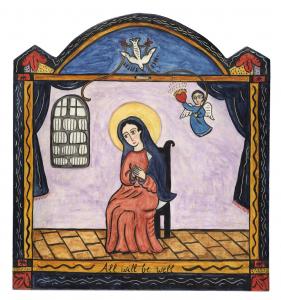There is no way that we should be thinking of Julian as gay or lesbian, but we should certainly think of her as queer (and as, she was undoubtedly female, in spite of her name). There are two reasons for including her here. The first is her pioneering unequivocal feminism. These are shown by her gender bending references in her book to God as mother - and even to Jesus as "mother Jesus", which are habits for us too to acquire in our prayer. In her own career, she was remarkable for producing the first book to be written in English by a woman. Can we think of her as the first feminist theologian?
"The Mother can lay her child tenderly to her breast, but our tender Mother Jesus can lead us easily into his blessed breast through his sweet open side, and show us there a part of the godhead and of the joys of heaven with inner certainty of endless bliss.
The second is the fundamental nature of her spirituality, which was centuries ahead of her time, and can be especially valuable to those who, like the LGBT community, feel threatened by an accusatory and hostile institutional Church. Here, it is important to note that her optimistic spirituality, as indicated in the well-known quotation in my headline, is not simply a Panglossian, mindless "always look on the bright side". There is a very sound theological basis for it, made clear in an expanded formulation of the idea:
"And so our good Lord answered to all questions and doubts which I could raise, saying most comfortably: I may make all things well, and I can make all things well, and I shall make all things well, and I will make all things well, and you will see yourself that every kind of thing will be well".
All will be well - because God has promised to make them well. Hope is a virtue - and optimisim a theological obligation.
Julian (not her birth name) was born in 1342. At the age of 30, she fell dangerously ill, coming close to death. At this time, she experienced a series of mystical visions on the Passion of Christ and on the love of God. After her recovery, she became an anchoress, and recorded her experiences which she described as "showings", in her book. She is renowned for her insistence in these on God's unbending love and care for Her people, which was unusual for a time when religion was seen in much stricter, more judgemental terms of avoiding eternal damnation.
Read "The Showing Of Love" on-line
The "Umilta" website has an astonishing collection of links to scholarly work on Juliana and her times ( including this useful one : Equally in God's Image Women in the Middle Ages
Friends of Julian describes itself as the "official" Julian website. I don't know on what authority they make the claim, but the site is at least attractive and informative.

No comments:
Post a Comment